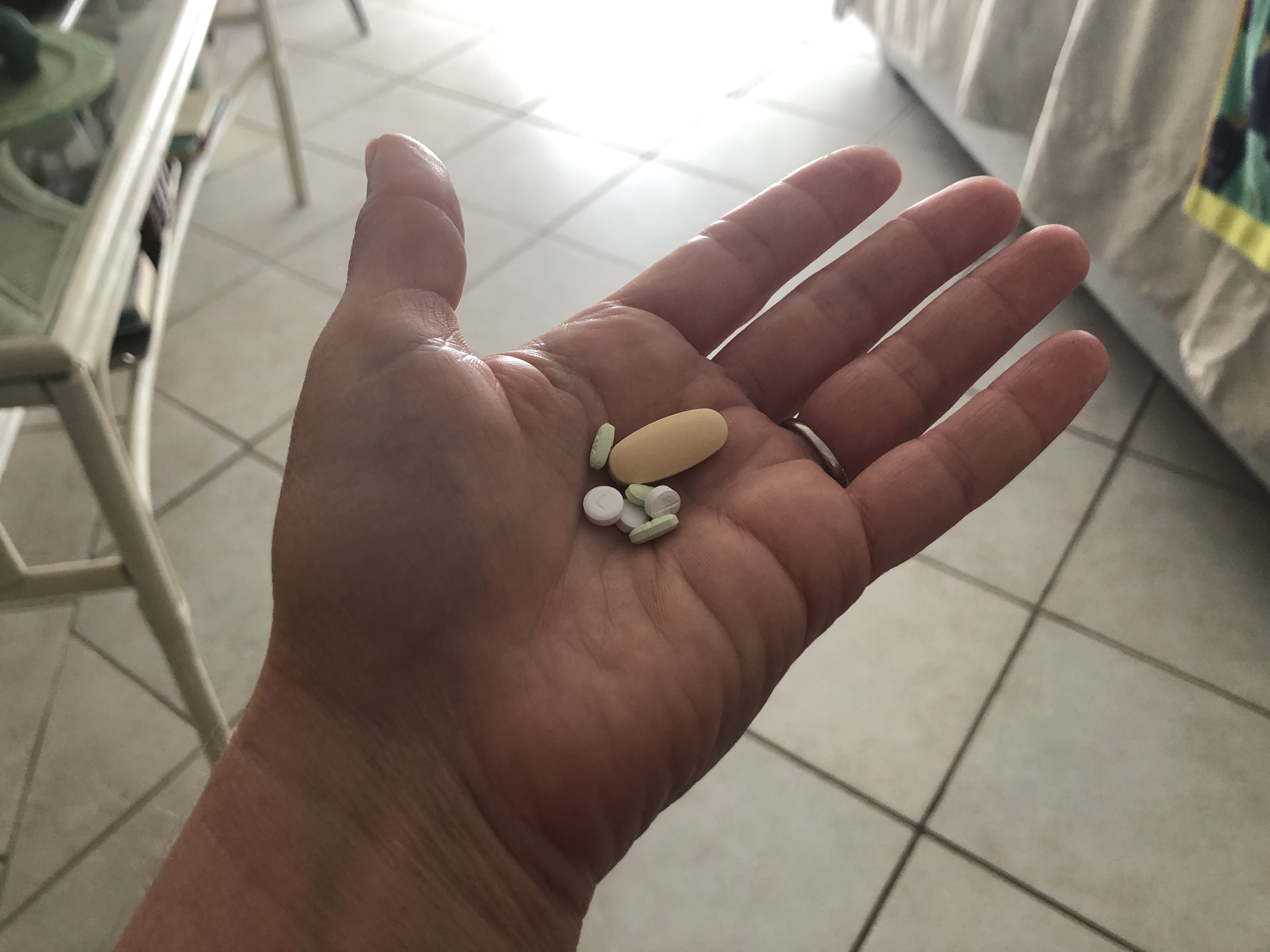
Jagged Little Pill: Time to Swallow the Psych Meds?
“Do you ever think about taking your own life?” asked the psychiatrist with a face like a board.
I stared into his clinical eyes. “No.”
It was a lie. After hauling myself up four flights of stairs to my dorm room, I’d tilt my head over the railing, imagining what it would be like to jump. To be at peace down there on the linoleum.
My therapist, Karen, couldn’t believe the MD didn’t prescribe me anything after that first and only visit. Mired down by the weight of depression, I never told her the story of the conversation between the wooden, expert man and me. I just kept slogging along, clinging to my weekly visits with Karen like a lifeline.

Several years, one graduation and two therapists later, there I was screaming and swearing in Joan’s office every other week. The office, like Joan herself, exuded safety – warm colors and cozy cushions everywhere, surrounding Joan with her kind eyes and flowing scarves. I wasn’t swearing at her, ever – more like swearing at my parents in absentia. Swearing at life and the world and the stranglehold that wouldn’t release from my brain.
A few sessions into my time with Joan, she suggested I try medication. I dodged and swore about something else, but Joan was persistent, bringing it up at the next session and the next. Finally, almost pleadingly, Joan told me that she had been on psychiatric medication herself.
My mother couldn’t believe it when I told her. That’s because we’d known Joan for years.
Fifteen years before I was sitting in her office, I knew Joan as Mrs. F, one of the other moms with kids on the summer swim team. An exceptionally kind one. I remembered Mrs. F calling out to me the day before a swim meet and telling me to eat a big pasta meal that night.
I ate the pasta meal then. And after a few weeks of Joan persisting, her voice filled with care, I agreed to try the pills.
Within weeks, the clouds broke. The gray heaviness that had fogged up the inside of my head for years dissolved. It was like going from a place where every single day was some shade of gray to one where the sun knew how to shine. It was like a little miracle. I could feel happy again.

Without knowing it, my parents and I were doing a little experiment as I started on meds. My mom knew. My dad didn’t. Within weeks after I started, he mentioned to my mom with surprise that “D’Arcy seems like her old self again.”
My dad is not known for his powers of human observation. My mom is the one who intuitively predicts the twists and turns of people in our lives. But when it came to my meds, I felt it and my dad saw it before she did. My first psychiatric med was a rip-roaring success.
Over the years I switched between a couple prescribing providers, because life, and a couple different meds, because insurance. Luckily every med we tried worked well with my biochemistry, as each transition was seamless. A couple of times providers, suspecting I had something more than depression, tried layering an additional med. The first time, it didn’t seem to make any difference. The second time, it made me sleepy. On the starting half dose, I didn’t much of it – I just felt pleasantly drowsy. I didn’t think to tell my provider, which was a mistake, because going up to the full dose really knocked me out.
I didn’t attribute this little misadventure to the fact that I hadn’t made any kind of point of monitoring how I was feeling after starting the new med, and therefore hadn’t realized that my sudden tiredness might be connected. I certainly hadn’t bothered contacting the provider before switching up to the full dose. Afterwards, I grumpily thought this particular provider had given me a med that I didn’t really need and took comfort in the fact that I was apparently a one-med miracle – nothing else needed, thanks ever so.

Well. Kind of. Ever since I started those first meds I have no more days hanging over railings and thinking about jumping. No more violent crying spells and banging my own fists on wooden floor till they ached and bloomed with tiny cuts. But I still had “the dips”. Especially in winter. Especially when sitting in front of washer & dryer, when the world outside was gray and so many of my precious weekend hours were sucked into the mundane stuff of daily life. I wasn’t anywhere near the lows of my unmediated 20’s, but I felt heavy and flat. And occasionally, very occasionally, the really scary thoughts hit again.
Without realizing it, I needed another Joan. And when my psychiatrist retired, I met her.
At our first appointment, Dr. W was warm, welcoming and wearing whimsical galoshes. Officially her job was to support my meds management, but our very first conversation traveled all over the well-being map and ended with her showing me the video of Michelle Obama talking about stress in her marriage. In therapeutic terms, Dr. W does a combination of med management, therapy and motivational interviewing at our check-in’s. In human terms, I trust her.
By our second or third visit, I was telling her about my wintertime dips. Years ago I’d done my own research and when I learned that sun lamps can trigger mania, I’d figured that was out for anyone bipolar, like me, and I’d just keep on chugging as best I could.
I can’t remember if I’d mentioned the sun lamp idea, or the winter time dips, to my psychiatrist before. And it’s not that I didn’t like and trust Dr. A – he was what I needed for many years. But Dr. W and I went to another level. She listened attentively to me describing the winter dips, and laid out some options to explore. One of them was adding another medication, for the winter months only.
Within weeks, it was renewed me, once again. Myself, but with a cloudy film removed. My off-and-on “what’s it all for” gloom lifted. No more was I sitting in front of the swirling laundry, trying to logic-talk myself out of my dips by reminding myself my cornucopia of blessings. Uphill battle, because depression is a wily opponent against logic.
Right now, the plan for me is to add the second med when days get darker and shorter. In spring and summer, I’m back to my one, with the on- and off-ramps for the second med roughly coinciding with the time change. Of course, the plan is open to adjustment. And Dr. W is in it with me.
Not long ago a friend asked me, how did you make the choice to go on meds?

As y’all now know, I came to meds only after years of caring people begging me to try. While I so appreciate all their love and support, I don’t recommend this.
A better path is to weigh the evidence, without judgment and with a good trustworthy provider, when you think about whether trying medication makes sense.
PSA: you are not inherently better or stronger if you don’t take medication. Whether or not you are taking a psychiatric medication has no bearing on your strength, capability, or moral goodness as a person.
If you decide that medication might make sense for you – here’s the best guidance I can offer you, after almost two decades of personal experience.
- Don’t do it alone. Find a good provider that you trust. Connect with them, honestly and ongoing.
- Take care of yourself. Eat good food. Exercise. Spend time with people you care about and can be real with. Tell them you’re trying medication, that support is invaluable. Do activities you love. Rest. Therapy, yoga, religious or spiritual practice can all be great – pick the things off the menu that work for you. If you’re reading this and thinking there is no way you have the energy to do any of that, please look back to step 1 and talk to your partnering provider.
- Monitor how you’re doing, communicate with your provider, and change when it makes sense to change.
- Meds are FOR YOU. You may have heard bad things, or good things, about a particular medicine, but that doesn’t mean it would be bad or good for you. You honestly reporting your experiences, your provider’s consideration of those experiences plus their training and expertise is the best guide to figuring out what makes sense.
- If one medication doesn’t work, don’t toss the baby out with the bath water. Another one, or another one, might. Anytime you’re adding, dropping or switching, it’s important to have a perspective of trial and monitor.
Hugs and love.